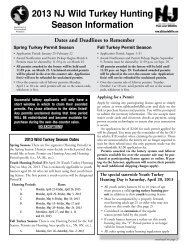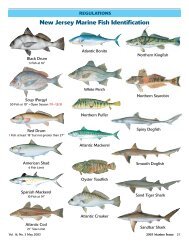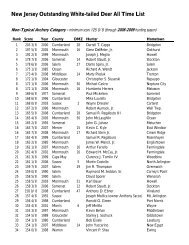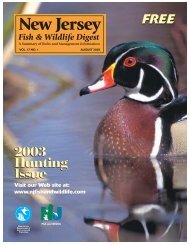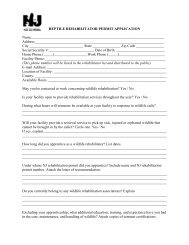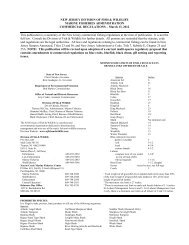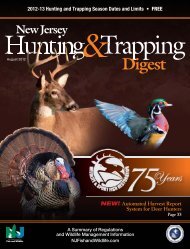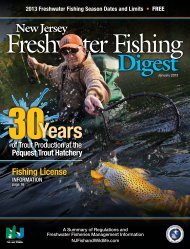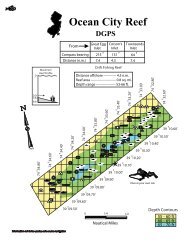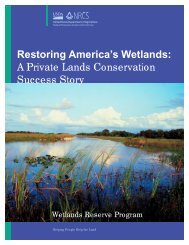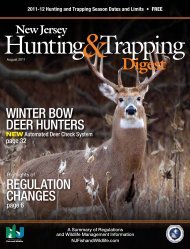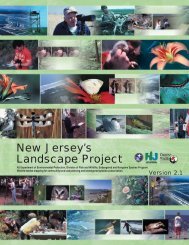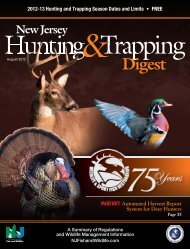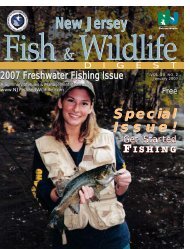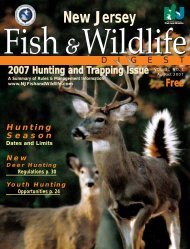Pages 1 - State of New Jersey
Pages 1 - State of New Jersey
Pages 1 - State of New Jersey
- No tags were found...
Create successful ePaper yourself
Turn your PDF publications into a flip-book with our unique Google optimized e-Paper software.
2000 - 2001 Migratory Bird RegulationsDuck and goose regulations are not confirmed at press time for this DIGEST.Watch for news releases in late August for information on season dates and baglimits. When finalized, migratory bird hunting regulations will be published in the“<strong>New</strong> <strong>Jersey</strong> 2000-01 Migratory Bird Regulations” available in September atlicense agents and Division <strong>of</strong>fices. Migratory Bird Regulations will also be availableon the Division website as soon as they are finalized atwww.state.nj.us/dep/fgw. Migratory bird season dates published in theMigratory Bird Regulations supersede those printed in this DIGEST if thereare differences.Season dates will not become final until approved by the U. S. Fish andWildlife Service in August. Following are the TENTATIVE dates for Septemberand special winter Canada goose seasons, sea ducks, rails, gallinules, snipe andcrows:Tentative DatesSeptember Canada Goose . . . . . . . . . . . . . . . . Sept. 1 - 30Special Winter Canada Goose . . . . . . . . . . . . Jan. 15 - Feb. 15, 2001Sea Ducks . . . . . . . . . . . . . . . . . . . . . . . . . . . Sept. 19 - Jan. 20, 2001Rails, Gallinules (Moorhens) . . . . . . . . . . . . . Sept. 1 - Nov. 9Snipe . . . . . . . . . . . . . . . . . . . . . . . . . . . . . Sept. 22 - Jan. 6, 2001Crows (Mon, Thur, Fri, Sat) . . . . . . . . . . . . Aug. 7 - Mar. 17, 2001(Except closed Dec. 4-9, 2000)Woodcock . . . . . . . . . . . . . . . . . . . . . . . . . . . See Migratory Bird RegulationsMourning Dove . . . . . . . . . . . . . . . . . . . . . ClosedYouth Waterfowl Hunting Day . . . . . . . . . . . . Sept. 30Duck populations in mid-continent areas <strong>of</strong> North America in 2000 are expectedto be below last year primarily due to poorer habitat conditions resulting from a dryand mild winter. However, many areas <strong>of</strong> eastern North America (where mostAtlantic Flyway ducks originate) experienced more average winter and springweather conditions. Migrant Canada goose populations have recovered substantiallysince the closure <strong>of</strong> the regular Canada goose season in 1995. However thismigrant population remains below population objectives. Early snowmelt in subarcticregions <strong>of</strong> eastern Canada from 1997 through 1999 resulted in excellentgosling production during those years. These 3 consecutive years with above averageyoung production are playing a key role in the recovery <strong>of</strong> this population.Spring conditions occurred later in 2000; gosling production will likely be lowerthan the past few years. A limited regular Canada goose season will be held in <strong>New</strong><strong>Jersey</strong> in 2000-01. Atlantic brant populations are above their long-term average. Asa result, brant hunting regulations may be more liberal than last year, particularly ifyoung production is good in arctic breeding areas this year. Snow goose populationsremain very high and liberal bag limits as well as seasons extending to March10 in some areas, are expected. Check the Migratory Bird Regulations for seasondates and bag limits.Note that there are no permit requirements for either the September or theSpecial Winter Canada Goose Seasons. As with all waterfowl hunting seasons, ahunting license, federal Migratory Bird Hunting Stamp, <strong>New</strong> <strong>Jersey</strong> WaterfowlStamp and HIP number are required to participate in these seasons. The SeptemberCanada Goose Season will be open statewide. The Division anticipates a specialwinter Canada goose season similar to the season held in <strong>New</strong> <strong>Jersey</strong> duringJanuary/February 2000, however a final decision on this season will not be madeby the USFWS until August. Note that any approved special winter season willnot be held statewide. The winter season is targeted at resident geese and is heldin areas <strong>of</strong> the state with relatively low proportions <strong>of</strong> wintering migrant Canadageese. The season is held in two distinct zones, one in the northern and the other inthe southeastern portion <strong>of</strong> the state. Check the 2000-01 Migratory BirdRegulations for exact zone boundary descriptions.Individuals recovering banded migratory birds are reminded to report the bandnumber by calling the U.S. Department <strong>of</strong> the Interior’s Bird Banding Laboratory(BBL) in Washington, D.C., toll free at 1-800-327-BAND. When you call, providethe operator with the band number, date the bird was recovered, exact location thebird was recovered (including the nearest town) and method <strong>of</strong> recovery (for example,shot or found dead). Hunters may keep the bands. In most cases, the operatorwill be able to keypunch the band number and instantly tell the caller the date andlocation <strong>of</strong> banding, as well as the age and sex <strong>of</strong> the bird at banding. In all cases,the BBL will mail the caller a Certificate <strong>of</strong> Appreciation with the same information.The information provided by banding data is critical in makingmanagement decisions regarding migratory birds.ATTENTION MIGRATORYBIRD HUNTERSYou must obtain a Harvest Information Program (HIP)number before hunting duck, goose, brant, woodcock, rail,snipe, coot or gallinule in <strong>New</strong> <strong>Jersey</strong>. Obtain your HIP numberby calling 1-800-WETLAND or by registering throughthe Division’s website at www.state.nj.us/dep/fgw. TheHIP number and phone call are FREE. The automated systemis operational 24 hours a day, 7 days a week. Note that ahunting license number isrequired when obtaining a HIPnumber. Therefore hunters should obtain a hunting licensebefore calling HIP; have the license number at hand whencalling. Then write your HIP number on the front <strong>of</strong> yourhunting license in the space next to “2000/01 Fall/Winter NJHIP#.” Call 1-888-764-7343 if you need assistance gettingyour HIP number.The HIP number is valid from September 1, 2000 untilMarch 10, 2001.If you hunt migratory birds in another state, you willneed to get a HIP number in that state following that state’sHIP procedures.Information collected in HIP is confidential and is usedby the US Fish and Wildlife Service for conducting migratorybird harvest surveys. As in the past, the US Fish andWildlife Service will mail harvest survey information to asmall, random sample <strong>of</strong> HIP registrants.WHAT DO I NEED TO HUNT MIGRATORYBIRDS IN NEW JERSEY?1. To hunt crows you need a <strong>New</strong> <strong>Jersey</strong> firearmhunting license – See page 3 & 6 for hunting licenserequirements and fees.2. To hunt woodcock*, rail, snipe, coot or gallinuleyou need a <strong>New</strong> <strong>Jersey</strong> firearms hunting license andHarvest Information Program (HIP) number – seeabove for HIP information.3. To hunt ducks, geese or brant you need a <strong>New</strong><strong>Jersey</strong> hunting license, HIP number, FederalMigratory Bird Hunting and Conservation Stampand <strong>New</strong> <strong>Jersey</strong> Waterfowl Stamp. Both Federal and<strong>State</strong> stamps are required for waterfowl hunters 16years <strong>of</strong> age and older and must be signed across thestamp’s face in ink. Federal stamps are available at U.S.Post Offices. <strong>State</strong> waterfowl stamps are available fromagents who sell hunting licenses.*Note: Woodcock Hunting Stamps are no longerrequired for hunting woodcock beginning in 2000.NEW JERSEY Fish & Wildlife DIGEST 11



